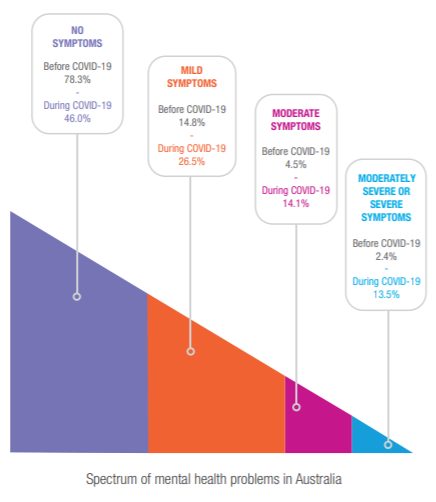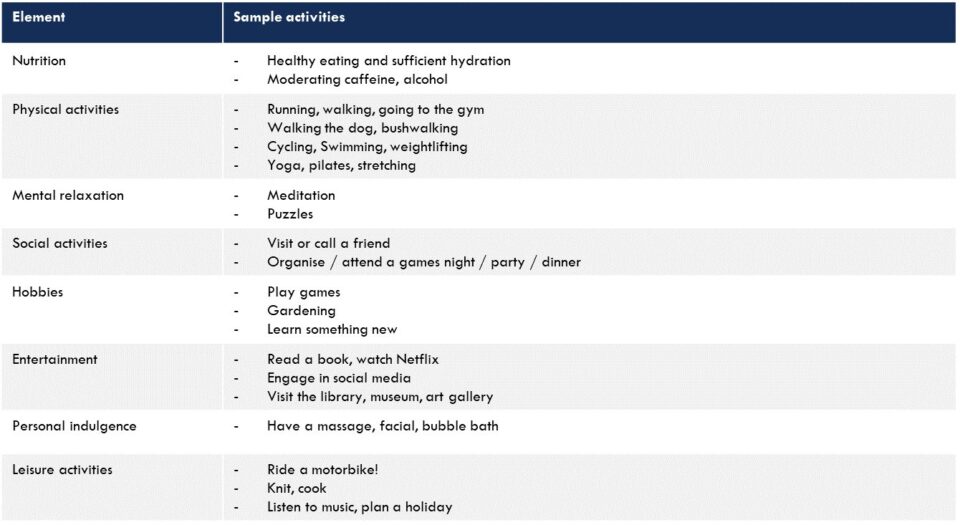
Actuaries and wellbeing – are you really OK?
Whether you work in financial services, insurance, superannuation, wealth management, government or other sectors, actuaries play an important role in contributing to the wellbeing of others. Actuaries support the health and financial wellbeing of others through our professional contributions across a range of industries. But are we doing enough to look after our own wellbeing and the wellbeing of our teams?
The theme of this year’s RU OK? Day[1] is ‘Are they really OK? Ask them today’. So, fellow actuarial professionals, I want to ask you “are you really OK?”.
Mental health is critical for good wellbeing
You’ve seen the headlines about how COVID-19 and associated lockdowns have impacted the mental health of many people. Monash University recently published results from their study[2] showing how the incidence of mental health symptoms increased[3] during the 2020 lockdown. Of those surveyed, 21.7% of Australians experienced some degree of mental health issues prior to COVID-19, however this increased to 54% during the pandemic in 2020.

As a former Lifeline counsellor, carer to family members with severe mental illness, and as someone who has suffered from anxiety and panic attacks, I can’t stress enough how important it is to seek professional help if you are concerned about the mental health of yourself or someone else. Your GP is a good place to start, and your nearest emergency department is available if you need urgent mental health care.
Wellbeing is important for you and your team
Clinical mental illness aside, taking action to support your broader wellbeing can enhance your overall life satisfaction. ‘Wellbeing’, as defined by the Oxford English Dictionary as “the state of being comfortable, healthy or happy”, is a broader concept that exists alongside and in addition to mental health. Wellbeing can span many aspects of your life, including your physical health, mental health, social connection, spiritual and emotional wellbeing.
As a professional, having tried and tested techniques to support your wellbeing and manage your stress levels is not only good for your health, but also for your team. This is especially important for those in management roles.
Wellbeing at work has come a long way from free fruit. The Heads Up[4] website quotes the following research and statistics:
- Around 90% of employees think mental health is an important issue for businesses, but only 50% believe their workplace is mentally healthy[5]
- Every $1 spent creating a mentally healthy workplace can, on average, result in a positive return on investment of $2.30[6]
- Organisations with a positive approach to mental health and safety have increased productivity, improved worker engagement and are better able to recruit and retain staff[7]
The research is clear: supporting mental health and wellbeing in the workplace is valued by employees and delivers better productivity, engagement and retention for employers.
What helps you to stay well?
Everyone is different – we all experience stress differently and need different things to help us stay well.
In the last year of my final actuarial exams, I was under a lot of stress and had to figure out what was important for my wellbeing. I listed these things on a piece of paper that I still keep blu-tacked to the wall as a reminder.

There’s no one-size-fits-all solution when it comes to supporting your wellbeing – it is a matter of finding things that you find helpful. For example, while I share my love of motorcycling with at least a few other actuaries, I know this isn’t every actuary’s idea of relaxation!
Many people find that stepping into their first management role brings new challenges and additional stress. Taking action to support your wellbeing becomes even more important and for this reason, I include a module on wellbeing in my small group coaching program for new actuarial managers. I was intrigued to discover that the wellbeing module has attracted the most engagement from the group. The module includes a guided desk meditation practice (click here to access the recorded practice), delivered by qualified yoga teacher and fellow actuary Sheridan Daniels. Sheridan discusses the importance of the breath and how powerful simply remembering to breathe can be when managing stress and wellbeing. She reminds us that while food and water are commonly considered essential to life, we can only survive a few minutes without breathing.
I also challenged each group member to try a new activity – something that they hadn’t tried before or hadn’t done in a while and to report back to the group. Some participants reconnected with old hobbies such as drawing and reading. Others tried new activities such as cooking and meditation. Some engaged in ‘lockdown-friendly’ activities such as online social hangouts and online team catchups. One manager pointed out that that giving themselves permission to ‘do nothing’ was also important in maintaining their wellbeing.
What would you add to this table based on your own experience?

How can you support the wellbeing of your team?
All team members have a role to play in supporting each other’s wellbeing. There are some excellent resources[8] online to help you have conversations with your fellow team members.
As managers, we have additional responsibilities to support the wellbeing of our team members. You could:[9]
- speak openly about mental health in the workplace and encourage others to do the same;
- educate your team through online resources and training;
- promote a positive working environment by minimising workplace risks to mental health, such as job stress; and
- Approach and have a conversation with an employee you are concerned about
My wellbeing challenge to you!
So, fellow actuaries and students, in light of lockdowns and R U OK? Day, I want to challenge you to do something to support YOUR wellbeing this week. Choose and complete an activity that you haven’t done before or haven’t done in a while. You could use the table above for inspiration or check out the longer list of hobbies at Wikipedia[10] for some ideas.
Leave a comment or drop me an email to let me know how it goes! I look forward to hearing about the activities you engage in to support your wellbeing. Enjoy!
|
[1] https://www.ruok.org.au/join-r-u-ok-day [2] https://www.monash.edu/medicine/living-with-covid-19-restrictions-survey [3] https://www.monash.edu/__data/assets/pdf_file/0006/2548284/covid-19-restrictions-and-mental-health-policy-brief.pdf [4] https://www.headsup.org.au/ [5] https://www.headsup.org.au/docs/default-source/resources/bl1270-report—tns-the-state-of-mental-health-in-australian-workplaces-hr.pdf?sfvrsn=94e47a4d_8 [6] https://www.headsup.org.au/docs/default-source/default-document-library/research-by-pricewaterhouse-coopers [7] https://www.headsup.org.au/docs/default-source/resources/instinct_and_reason_employer_of_choice.pdf?sfvrsn=4 [8] https://www.ruok.org.au/how-to-ask [9] https://www.headsup.org.au/supporting-others/if-you-manage-others [10] https://en.wikipedia.org/wiki/List_of_hobbies |
CPD: Actuaries Institute Members can claim two CPD points for every hour of reading articles on Actuaries Digital.






